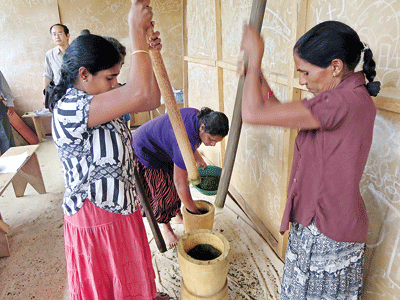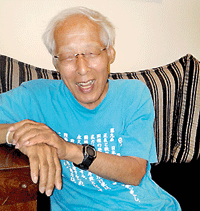Back to his learning roots

Making ‘Wangedi Pekoe’: Minimal use of machinery
My love for the people of Sri Lanka is immense as they gave me the best years of my life,” reflects Prof. Nakamura Hisashi during his recent visit to the country, representing JIPPO, a non-profit Japanese organisation, which is attempting an ambitious livelihood programme for small-scale tea cultivators in Haldummulla.
Interestingly, Prof. Nakamura was here as a young economist sent to neighbouring Asian countries during the post-World War II period to learn the ways of economic life and culture in the broad sense.
“I came to the University of Ceylon at Peradeniya in 1965 and stayed till 1969. Prof. H. A. de S. Gunasekera was a great mentor during my post-graduate studies. He taught me how to organise a research project of economic survey within the limited time span and guided me to write a paper based on a field study. Sinhala lecturers like Drs. D. D. Saram, Don Ariya Rajakaruna and Kusuma Jayasuriya taught colloquial Sinhala to foreign students. But, I learned more from village people and plantation workers on the social and economic problems rather than in campus,” recollects Prof. Nakamura with a smile.
Visiting villages and living with peasant cultivators from the dry and wet zones during his Peradeniya days are among his most treasured memories. “I also travelled extensively to many big tea plantations in Uva Province like Great Western, St. James, Uva Highland, Dambatanne etc. and had interviews with workers and collected addresses of their original villages in South India. Many of them were concentrated in Tiruchirappalli District of Tamil Nadu. Then, I went to those villages to conduct in-depth socio-economic surveys for nearly two years.” These village-based studies are documented in both English and Japanese.
During his time with the Institute of Development Economies under the Ministry of International Trade and Industries in Japan, Prof. Nakamura taught in many Japanese universities. He was appointed the Professor of Economics at Ryukoku University in Kyoto in 1984 and served as an overseas visiting lecturer at several universities including the University of Colombo. Today he is the Executive Director of JIPPO, a non-profit organisation established by the largest Buddhist Sect called Jodo-shinshu in Japan, in conformity with the fundamental Buddhist principle that all things in the world are interdependent and interconnected, to promote positive exchanges between individuals and groups of all regions of society.
Fair-trade practices are at the root of JIPPO which imports tea and coffee to support disadvantaged producers and provide them with stable income. The organic tea import project piloted in Haldummulla, in the Uva Province recently after extensive research initiated in 2013, lives up to JIPPO’s pledge towards independent, environmental-friendly and organic farming.
Interestingly called ‘Wangedi Pekoe’, this is hand-made tea – the result of the painstaking research by JIPPO and the local partner Uva Small Tea Farmers Society. It revives a long forgotten practice of using traditional wangedi or mortar to produce pekoe (high quality black tea from young leaves) in the early days of the island’s tea culture, says Prof. Nakamura. The project is being conducted at Sri Pushparamaya Temple of Haldummulla. The Chief Prelate of the temple and the President of the Uva Small Tea Farmers Society, Ven. Kalupahana Seelananda Thera asserts that the project will strengthen the capacity of the small scale tea farmers to earn a sustainable living. The five-pronged process of withering, pounding, fermenting, drying and packing of tea is soon to shift to a more expansive processing facility says Ven. Seelananda Thera who adds that the famers’ response is very positive.

Prof. Nakamura Hisashi
Retired planter and the Secretary of the Society, Michael Newman hopes to make Wangedi Pekoe a sustainable enterprise which will eventually target tourists. “A few local hotels have already shown interest, however we need to enhance our production volumes,” says Newman. Samples have been sent to Japan for testing and tasting and tapping the Japanese market in which there is a great demand for hand-made tea is envisaged by the scheme.
Small scale tea farmers who presently supply 25-60 kilos of tea leaves monthly to large scale factories receive only about Rs. 90 per kilo and the Wangedi Pekoe scheme encourages them to revive their presently neglected estates to earn a much higher price for their produce, observes planter and the Treasurer of the Society, M.R. Gamini. Presently about 20 such small scale farmer families are benefited says Gamini who also points out that use of machinery is minimal in the project. “In this process, the tea roller used by factories is replaced with mortar and bio-gas will be eventually used for drying,” he says.
The Japan-Sri Lanka facilitator, Upul Amarasinghe sees it as countering the crisis faced by the tea industry to a certain extent. “Today the industry has to grapple with high production costs, wastage and high energy consumption. Exercises such as Wangedi Pekoe project which is hoped to be expanded to a more streamlined cottage industry can address these issues,” says Amarasinghe who cites the Japanese experience of home-based tea brands. The interest already shown by several tea importers in Japan in our organic tea is significant, he says, adding that the project can even give an impetus to the small scale tea farmers to convert their lands to organic tea growing plots.


